When working with prop firms, traders often encounter pitfalls that can significantly impact their performance and profitability. Common mistakes traders make when working with prop firms include failing to adhere to strict risk management protocols, over-leveraging their positions, and neglecting to diversify their trading strategies. These errors can lead to substantial financial losses and missed opportunities.
Common mistakes traders make when working with Prop Firms
Common mistakes traders make when working with prop firms that not everyone knows. Let’s follow the trading mistakes below:

Ignoring Risk Management
One of the most common mistakes traders make when working with Prop Firms is neglecting risk management. Proper risk management involves setting stop-loss orders, using appropriate position sizes, and adhering to a predefined risk-reward ratio. Traders who ignore these principles often face significant drawdowns or complete account blowouts.
Without risk management, a single bad trade can wipe out a substantial portion of a trader’s capital. Prop firms typically have stringent risk management rules to protect their capital, and failing to adhere to these rules can lead to penalties or even termination of the trading relationship.
Overtrading
Overtrading occurs when traders take too many positions or trade excessively in the belief that more trades will lead to higher profits. This often results from a lack of patience or a misunderstanding of market conditions.
Overtrading can increase transaction costs, lead to higher exposure to market risk, and decrease overall profitability. It can also be a sign of emotional trading or a lack of confidence in a trading plan.
Lack of Discipline

Discipline in trading means sticking to a well-defined trading plan and avoiding impulsive decisions based on emotions or short-term market movements. Traders often struggle with maintaining discipline, especially in volatile or fast-moving markets.
Lack of discipline can lead to inconsistent trading performance, increased risk, and losses. Deviating from a trading plan can result in missed opportunities or poorly timed trades.
Inadequate Research and Preparation
Successful trading relies on thorough research and preparation. Traders who enter trades without understanding the underlying market conditions, economic factors, or technical indicators may find themselves at a disadvantage.
Inadequate research can result in poorly informed trading decisions, leading to losses or missed opportunities. It can also increase vulnerability to unexpected market movements or news events.
Poor Record-Keeping

Detailed record-keeping involves tracking all trades, including entry and exit points, trade rationale, outcomes, and any lessons learned. Many traders neglect this practice, which hinders their ability to analyze and improve their performance.
Without accurate records, traders may struggle to identify patterns or errors in their trading strategies. This can prevent them from making necessary adjustments and learning from past mistakes.
Emotional Trading
Emotional trading involves making decisions based on feelings such as fear, greed, or frustration rather than logical analysis. This often leads to impulsive trades, chasing losses, or deviating from the trading plan.
Emotional trading can result in inconsistent performance, increased risk, and significant losses. Traders who let emotions drive their decisions may find it challenging to maintain a steady and disciplined approach.
Inadequate Use of Technology

Modern trading relies heavily on technology, including trading platforms, analytics tools, and risk management software. Traders who do not use these tools effectively may miss out on valuable insights or opportunities.
Inadequate use of technology can limit a trader’s ability to analyze markets, execute trades efficiently, and manage risk effectively. This can result in missed trades or suboptimal performance.
Conclusion
In conclusion, understanding and avoiding the common mistakes traders make when working with prop firms is crucial for long-term success in the trading world. Additionally, thorough research, adherence to firm rules, proper use of technology, and meticulous record-keeping are essential practices that can prevent costly errors. Embracing these strategies not only helps in navigating the challenges associated with prop trading but also fosters a more disciplined and informed approach to achieving trading goals.
See more:











